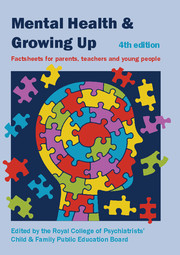Book contents
- Frontmatter
- Contents
- Contributors
- Factsheets for young people
- Factsheets for parents, carers and anyone who works with young people
- 1 Good parenting
- 2 The restless and excitable child
- 3 Dealing with tantrums
- 4 Children who soil or wet themselves
- 5 Sleep problems in childhood and adolescence
- 6 Behavioural problems and conduct disorder
- 7 Attention-deficit hyperactivity disorder (ADHD)
- 8 The child with general learning disability
- 9 Specific learning difficulties
- 10 Autism and Asperger syndrome
- 11 Depression in children
- 12 Worries and anxieties: helping children to cope
- 13 Divorce or separation of parents: the impact on children and adolescents
- 14 Death in the family: helping children to cope
- 15 The emotional cost of bullying
- 16 Traumatic stress in children
- 17 Domestic violence: its effects on children
- 18 Child abuse and neglect: the emotional effect
- 19 Drugs and alcohol: what parents need to know
- 20 Self-harm in young people
- 21 Psychosis
- 22 Schizophrenia
- 23 Bipolar disorder in children and adolescents
- 24 Obsessive–compulsive disorder in children and young people
- 25 Eating disorders in young people
- 26 Chronic physical illness: the effects on mental health
- 27 Medically unexplained physical symptoms
- 28 Chronic fatigue syndrome: helping your child get better
- 29 Parental mental illness: the problems for children
- 30 Who's who in CAMHS
10 - Autism and Asperger syndrome
from Factsheets for parents, carers and anyone who works with young people
Published online by Cambridge University Press: 02 January 2018
- Frontmatter
- Contents
- Contributors
- Factsheets for young people
- Factsheets for parents, carers and anyone who works with young people
- 1 Good parenting
- 2 The restless and excitable child
- 3 Dealing with tantrums
- 4 Children who soil or wet themselves
- 5 Sleep problems in childhood and adolescence
- 6 Behavioural problems and conduct disorder
- 7 Attention-deficit hyperactivity disorder (ADHD)
- 8 The child with general learning disability
- 9 Specific learning difficulties
- 10 Autism and Asperger syndrome
- 11 Depression in children
- 12 Worries and anxieties: helping children to cope
- 13 Divorce or separation of parents: the impact on children and adolescents
- 14 Death in the family: helping children to cope
- 15 The emotional cost of bullying
- 16 Traumatic stress in children
- 17 Domestic violence: its effects on children
- 18 Child abuse and neglect: the emotional effect
- 19 Drugs and alcohol: what parents need to know
- 20 Self-harm in young people
- 21 Psychosis
- 22 Schizophrenia
- 23 Bipolar disorder in children and adolescents
- 24 Obsessive–compulsive disorder in children and young people
- 25 Eating disorders in young people
- 26 Chronic physical illness: the effects on mental health
- 27 Medically unexplained physical symptoms
- 28 Chronic fatigue syndrome: helping your child get better
- 29 Parental mental illness: the problems for children
- 30 Who's who in CAMHS
Summary
What does autism spectrum disorder mean?
Children and young people with autism spectrum disorder have articular difficulties:
• in communicating
• being around people socially, and
• with their behaviour.
Individuals with an autism spectrum disorder can have a range of intellectual ability from having severe intellectual disabilities, to being more academically able and in mainstream education. About 10% of people with autism may also have some special skills and abilities.
For a diagnosis of autism, there must be evidence of unusual development in the first three years of life. ‘Asperger syndrome’ is a term used for some higher-functioning people on the autism spectrum who have intellectual ability in the average range and no delays in learning to talk. Many often have intense interests such as train timetables, buses or dinosaurs.
What are the characteristics?
The characteristics of children and young people with autism spectrum disorder will vary depending on their age, developmental level and how severely they are affected.
The difficulties are also likely to change over time. Parents are usually (but not always) the first to have some concerns about their child's development, and difficulties may be noticed from as early as infancy.
Overall, the problems and behaviours can be divided into three main areas.
• Difficulties with communication Children and young people with autism spectrum disorder have difficulties with both verbal communication (speaking) and non-verbal communication (eye contact, expressions and gestures). Some children may not be able to talk at all or have very limited speech. Some have good speech and language skills, but still have difficulty using their speech socially or to maintain a conversation. Their use of language may be very formal or ‘adult-like’. They may talk at length about their own topics of interest, but find it hard to understand the back-and-forth nature of two-way conversations.
• Difficulties with social interaction Children and young people with autism spectrum disorder have difficulty understanding the ‘social world’, for example, they often struggle with recognising and understanding their own feelings and those of people around them. This in turn can make it difficult for them to make friends. They may prefer to spend time alone, or appear insensitive to others because of their difficulties understanding social rules and expectations. Others may want to make friends, but have difficulties understanding someone else's point of view.
- Type
- Chapter
- Information
- Mental Health and Growing UpFactsheets for Parents, Teachers and Young People, pp. 74 - 76Publisher: Royal College of PsychiatristsPrint publication year: 2013



